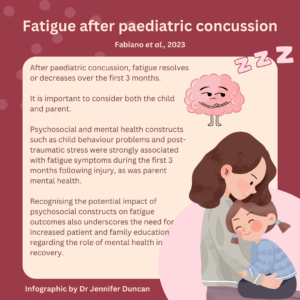Authors: Fabian Fabiano and Vicki Anderson
This blog provides a summary of a recent study published in BJSM, which investigated post-concussion fatigue during the first 3 months following injury and explored the factors associated with persisting fatigue [1].
Why is this study important?
Fatigue is among the most common and debilitating persisting symptoms following paediatric concussion. All aspects of fatigue are likely to have wide-ranging impacts on the child in daily life, including reduced school, psychosocial, and physical participation, lower cognitive function, mood and quality of life, and increased parent burden [2-8]. However, paediatric post-concussion fatigue remains under-researched, and the assessment of fatigue is rarely included in clinical treatment or management. The handful of studies that have assessed fatigue following paediatric concussion provide inconsistent findings, and there has been little attention paid to the social and mental health consequences of persisting fatigue.
How did the study go about this?
240 children and adolescents aged 5 to 18 years (M = 11.64, SD = 3.16) completed assessments of fatigue and other symptoms during the first three months following the injury. We plotted the recovery of fatigue (general, cognitive and sleep/rest fatigue domains) at 1 week, 1 month, and 3 months post-injury. We then explored factors associated with these symptoms for both parent and child ratings of fatigue at each timepoint. These included demographic variables, acute concussion symptoms, and child and parent social and mental health variables.
What did the study find?
We found that children’s fatigue decreased between the acute post-injury stage to three months. Both child and parent ratings displayed the predicted significant decreases over time in all fatigue domains and total fatigue, but child ratings indicated the greatest decrease from 1-4 days to one month, whereas parent ratings indicated a decrease mostly from 1-3 months. This discrepancy could reflect a lag in parent ratings, as decreases in the subjective experience of fatigue might occur in the child before it is noticed by the parent. Supporting this explanation, child ratings of fatigue also indicated a larger reduction in fatigue than parent ratings.
For both child and parent fatigue ratings, child mental health was the most significant factor associated with fatigue at all timepoints. Child and parent mental health variables were significantly associated with both child and parent ratings of fatigue at all timepoints.
What are the key take-home points?
Few have demonstrated that, after paediatric concussion, fatigue resolves or decreases over the first three months. Our findings highlighted the importance of considering both child and parent measures when assessing fatigue, as they may display differences in the rate of fatigue recovery. Psychosocial and mental health constructs such as child behaviour problems and post-traumatic stress were strongly associated with fatigue symptoms during the first three months following injury, as was parent mental health. Links between fatigue and child mental health symptoms indicate the critical role of mental health screening in clinical follow-up and management of child concussion, and highlights the importance of multidisciplinary approaches to concussion management with close collaboration between healthcare professionals, such as paediatricians, sports medicine specialists, psychologists, and physiotherapists. Recognising the potential impact of psychosocial constructs on fatigue outcomes also underscores the need for increased patient and family education regarding the role of mental health in recovery.

References
- Fabiano, F., et al., Fatigue recovery and connected factors following paediatric concussion. British Journal of Sports Medicine, 2023: p. bjsports-2023-106894.
- Wilkinson, J., et al., Fatigue following Paediatric Acquired Brain Injury and its Impact on Functional Outcomes: A Systematic Review. Neuropsychology Review, 2018. 28(1): p. 73-87.
- Gedaly-Duff, V., et al., Pain, Sleep Disturbance, and Fatigue in Children With Leukemia and Their Parents: A Pilot Study. Oncology Nursing Forum, 2006. 33(3): p. 641-646.
- Gold, J.I., et al., Pain, fatigue, and health-related quality of life in children and adolescents with chronic pain.Clin J Pain, 2009. 25(5): p. 407-12.
- Goretti, B., et al., Fatigue and its relationships with cognitive functioning and depression in paediatric multiple sclerosis: Clinical and Laboratory Research. Multiple Sclerosis Journal, 2012. 18(3): p. 329-34.
- Meeske, K., et al., Parent proxy-reported health-related quality of life and fatigue in pediatric patients diagnosed with brain tumors and acute lymphoblastic leukemia. Cancer, 2004. 101(9): p. 2116-2125.
- Ryan, L.M. and D.L. Warden, Post concussion syndrome. Int Rev Psychiatry, 2003. 15(4): p. 310-6.
- Gordijn, M.S., et al., Sleep, fatigue, depression, and quality of life in survivors of childhood acute lymphoblastic leukemia. Pediatric Blood & Cancer, 2013. 60(3): p. 479-485.